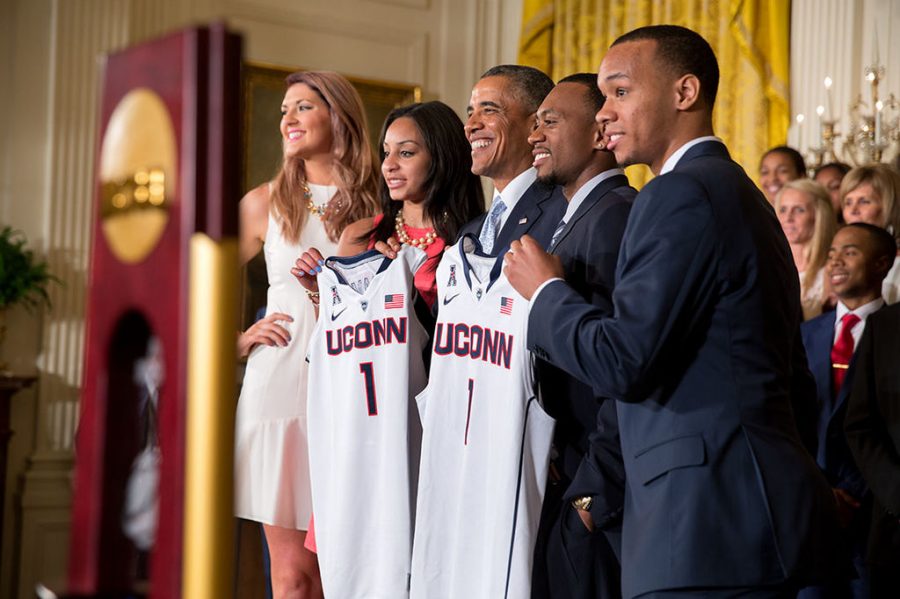Critics of UConn’s success are missing the point
OPINION
Wikimedia Commons/Creative Commons license
The men’s and women’s basketball teams at UConn were honored together at the White House when both won titles in 2014.
Honestly, female athletes can’t seem to get a break.
It seems like our continued presence and dominance in sports warrants negative treatment. Even when women are playing the game right, and arguably better than their male counterparts, people like Dan Shaughnessy still criticize.
Mr. Shaughnessy, a columnist for The Boston Globe, wrote a piece on March 28 headlined “UConn women are too dominant for their own good,” in which he claims that UConn’s dominance in winning four consecutive national championships is ruining women’s basketball.
The piece was published just before the Huskies defeated Syracuse by 31 points to win their most recent title. The win capped a 38-0 season (with an average margin of victory of 39.7 points) and ran their winning streak to 75.
Mr. Shaughnessy argues that this kind of dominance is bad for the sport because the Huskies have no competition.
It’s true, the UConn Huskies are great at what they do. Their wins come from determination and skill, which at the moment seems to be unparalleled.
I get what you are saying, Mr. Shaughnessy. If a team wins all of its games by such high margins, is there really any reason to watch? Sure, competition plays a big part in making a game appealing to a television audience. But I think that you’re forgetting one very important truth of sports: everyone loves a David and Goliath story.
Underdog stories sell. Hollywood seems to know this, especially with movies like Rocky, The Karate Kid, and Bring It On becoming successful enough to spawn several sequels. Audiences love to watch winners, if only to watch them fall.
Even outside of Hollywood this is true, just thinking back to last year. Tennis player Serena Williams, who was ranked No. 1 in the world, was going for a calendar-year Grand Slam of all four major titles: Australian Open, French Open, Wimbledon, and U.S. Open.
Ms. Williams’ bid for a Grand Slam caused the championship match for the U.S. Open to sell out before the men’s final for the first time in the tournament’s history, according to the United States Tennis Association. People wanted to watch Ms. Williams win, and they weren’t deterred by her “excessive dominance.”
Champions, especially ones with a streak, are good for the game. Champions inspire underdogs, and they inspire athletes to aim higher and push harder.
Criticizing UConn for being too dominant also draws attention away from the hard work and time that went into crafting such a fine team. Mr. Shaughnessy, you make it sound as if every game the Huskies played was handed to them on a silver platter.
The Huskies worked hard all season, and they deserve to be recognized for that. Since, as you note in your column, you have had several women in your life become successful athletes, surely you must know the time and effort that goes into each match, or even the effort that goes into trying to be held in the same esteem that male athletes are.
This dismissal of female athletes’ accomplishments is echoed all across sports. Raymond Moore, a prominent former tennis player who coordinates a perennial and well-attended event in Indian Wells, Calif., seemed shockingly out of touch in his own sport, recently stating that female athletes “don’t make any decisions, and they are lucky. They are very, very lucky.”
Why are they lucky, according to Mr. Moore? Because men make their opportunities possible.
It’s not luck, and it’s not riding on the coattails of men. It’s plain hard work. For some reason, women, even if they are champions in their respective sport, have to work harder than anyone else in order to gain respect. Winning doesn’t seem to be enough.
If the success of women in sports worries you, Mr. Shaughnessy, then perhaps you should stop watching. But that won’t stop women’s sports from attracting droves of viewers. Just look to the championship match of the 2015 FIFA Women’s World Cup between the United States and Japan, which drew a record 23 million viewers, making it the most watched soccer match in United States history.
In addition, as The New York Times’ Harvey Araton put it, “the top-seeded teams in three of the regionals [in the 2016 NCAA Tournament]—often as reliably Final Four-bound as UConn—were sent home by opponents demonstrating a greater depth and a commitment that is gradually taking root.”
Other teams are improving, and next year UConn might not beat them so easily–or beat them at all.
Sure, UConn doesn’t have any real competition–yet. But every underdog story starts with a Goliath, someone who’s held the championship seat for too long.
Perhaps this time it will be the UConn Huskies who fall.

Alyana has always had a passion for keeping up with current events, sharing her opinions and mindset, and contributing to a group effort. Her twin sister...


